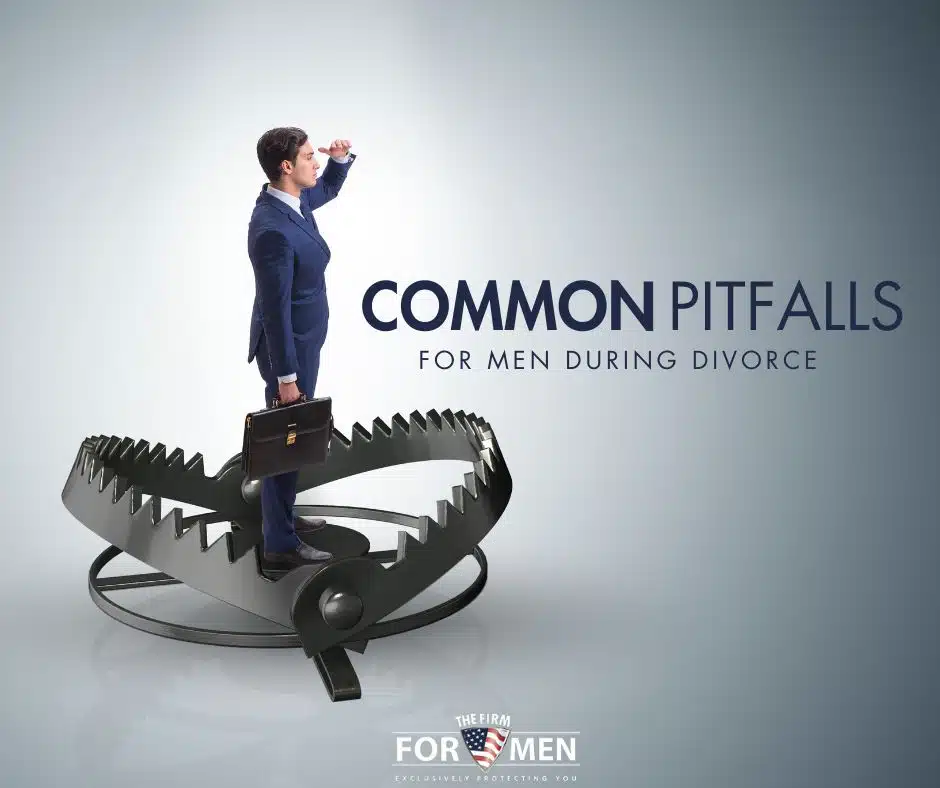A pitfall trap, says the Virginia Cooperative Extension, is ideal for collecting arthropods, if collecting arthropods is your jam. A pitfall is a pit — or in this case a 32-ounce plastic cup — that prey falls into. In Ye Olden Dayes people really did use snares and traps to catch dinner. Today, Virginia men need to beware metaphorical pitfalls during their divorce.
Jump to a Section
- Myths About Men Divorcing
- Ignoring or Downplaying the Divorce
- Talking Too Little or Too Much
- Being Reactive Instead of Proactive
- Representing Yourself in Divorce
Myths About Men Divorcing
Divorcing Virginia men often begin their proceedings with one hand tied behind their back. They assume many things based on myth and folklore:
- Men’s rights are subservient to women’s rights in divorce
- Men cannot gain child custody
- Legal advice from divorced friends is helpful and correct
- Men have to move out of the marital home right away
None of these things is true. In Virginia law on child custody, for example, the wording is, “As between the parents, there shall be no presumption or inference of law in favor of either.” The divorce experience of acquaintances is not your divorce experience. And you can separate and divorce even while living under the same roof.
Ignoring or Downplaying the Divorce
“Deal with reality or reality will deal with you,” said District Attorney Fani Willis. A common pitfall for Virginia men in divorce proceedings is to ignore those proceedings. Pretend they are not happening and, somehow, they will magically stop.
Divorce proceedings do not stop because you choose not to participate. Your spouse can file for divorce without your approval. Not responding to court proceedings puts you at a disadvantage. A Virginia Circuit Court judge will move ahead, taking your lack of participation as tacit approval for whatever is decided.
Similarly, ignoring any aspect of separation and divorce will put you at a disadvantage:
- Marital finances — Pay attention to joint accounts, bills, and debt
- Failing to assert your rights — Refusing to respond to positions or arguments brought up by your spouse and opposing counsel only diminishes you
- Property settlement agreement — Advocate for yourself in equitable division of property, child custody, and parenting time
Talking Too Little or Too Much
You can say too little when you withhold information from your own attorney. You can say too much by speaking up during conferences or in a courtroom instead of letting your lawyer talk for you. Your attorney is not nicknamed your mouthpiece accidentally. Other verbal miscues:
- Trash-talking your children’s mother — You diminish yourself and your kids when you make her the enemy instead of just the opposing party
- Silently acquiescing to your spouse’s demands in property settlement, spousal support, or child support — You might think you are being a stand-up guy by letting her steamroller you; you are not helping your case at all by not speaking up for yourself (through your attorney) and making your own demands or pushing back against your spouse’s demands
- Quibbling over every asset — Choose your battles and be willing to let a beloved motorcycle go if you can snag the vacation home; let your spouse have items sentimental to her so you can have items of value to you
Being Reactive Instead of Proactive
Possibly the greatest pitfall to a vigorous, healthy Virginia man is to react with anger to events as large as separation and divorce. Men tend to shift to anger to overcome fear, and that can come out in some very unhealthy and legally perilous ways:
- Threatening your spouse or your spouse’s attorney
- Retaliating against your spouse
- Fighting in front of your kids
- Threatening court clerks, judges, or officers of the court
- Kidnapping your own children
- Self-harming
- Behaving spitefully in the presence of your spouse, opposing counsel, or court officers
You may feel a lot of anger and resentment, especially if the divorce did not start with you. You cannot bottle that rage up, nor can you use your attorney as your therapist.
You can, though, seek a therapist. Take care of your physical and mental well-being. FInd a religious leader, counselor, therapist, or long-time friend to tell your troubles to and get concrete suggestions for dealing with those troubles.
You can find ways to channel your displaced aggression into constructive efforts:
- Read up on Virginia divorce law
- Dig deep into marital finances to find receipts, track down withdrawals from accounts, and value retirement accounts
- Attend anger management classes
- Develop a new hobby — Being creative can allow you to express emotions in a safe, healthy way
- Prepare lists of demands, requests, and suggestions for property settlement, child custody, visitation schedules, and spousal support
Representing Yourself in Divorce
Just about the biggest pitfall a Virginia man can make is to represent himself in separation and divorce proceedings. Unless you have a law license and are an experienced family law attorney, you do not know what you are doing.
- Hire a family law attorney — As soon as you have an inkling you (or your spouse) will seek separation and divorce, you need to be represented by a professional
- Talk candidly with your attorney — Make clear the reasons for the divorce, your financial situation, and the structure of your family and extended family
- Be prepared for divorce proceedings — they can take time, cost money, and intrude on your personal and professional life
- Listen to your attorney’s advice — If you think these are all the pitfalls Virginia men face in divorce, you have not spoken with a Virginia attorney
The Firm For Men is your ideal partner for your Virginia divorce. Contact our experienced attorneys today or call our office at (757) 383-9184 to schedule an appointment. We can help you avoid pitfalls, snares, traps, and even the occasional arthropod.

